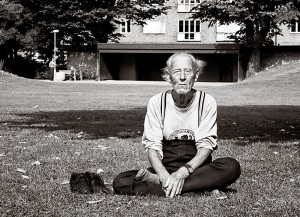Meditation is likely to be a central practice for many people applying the Middle Way to change their lives. There are a wide range of possible meditation practices, from different traditions, but what they have in common is that they are all ways to purposely access a more open and aware state of mind. You could understand this in terms of temporarily relaxing the obsessive states of the left hemisphere of the brain.
The Middle Way does not offer new meditation practices so much as a distinctive way of approaching them – an approach that is likely to fit with the most effective practice of experienced practitioners from many meditative traditions.
Effective meditation, in whatever tradition, consists simply in addressing the conditions of the mind. In order to simply become aware of the processes of the mind in experience it is necessary to cultivate calmer, internally-focused, more intense and directed states of mind, so much of the earlier stages of meditation are directed simply to that end. We need to be able to relax the superficial desire for new stimuli that actuates most of us a lot of the time, in order to get a wider perspective on the thoughts that constantly arise for us. Meditation is not just about relaxation, but that relaxation is a means to an end of addressing and working with mental conditions.
Both in dealing with distractions to reach a more absorbed meditative state, and in working once you get there, the Middle Way is central. On the one hand one can undertake meditation in a very idealised, driven way where one wishes to reach a certain goal. This is not an effective way to work because in being constantly focused on particular goals one tends to neglect the underlying conditions. If you want to become more content, for example, but don’t recognise the psychological conditions that are making you discontented, then you will probably not succeed in addressing them. Your determination to become contented will undermine itself. This is one extreme of metaphysical view with which meditation can be ineffectively approached.
On the other hand, it is also possible to slip into meditation like a warm bath and just use it for brief pleasurable experience or relaxation. This is also an ineffective and metaphysical approach, because it avoids the recognition that there is a larger, moral, purpose to meditation. This approach is not likely to be effective for very long because it just coasts on short-lived good conditions which then finish, and the underlying issues are not addressed. If you just approach meditation in order to feel good, then wonder why it stops making you feel good and becomes a struggle after a while, it is because wider conditions have not been addressed and meditation has not been approached with a big enough purpose.
The Middle Way in meditation demands a constant attempt at awareness, from one moment to the next, as to whether one is slipping towards one extreme or the other. At one moment there may be a gathering of energy and a reflection on the goal of the meditation, but then it may become too rigid and stop engaging with experience. Then we might go back the other way and relax into engagement with experience, but lapse into a daydream because we have lost all sense of direction. The middle point at which we work most effectively is so subtle that it takes constant re-direction to find.
In this way we can experience most directly the process of navigation towards the Middle Way that can be gone through in other areas of experience outside meditation. The process of straying on one side or the other is similar to that undergone by someone struggling to concentrate on a task, or by a team of people working on a long-term project, by a scientist seeking evidence for a theory, or even a government attempting to implement its manifesto. In the whole of experience we tend to ricochet between over-strong conceptions of the conditions we are working with and over-weak ones, until a point of balance can be found. Meditation simply practises that balancing process in limited and controlled conditions.
Unfortunately there are also other less helpful concepts that can be associated with meditation. One is that meditation leads us to a special mental state in which truths about the universe can be discovered – this may be understood as finding God, achieving “Insight” with a capital “I”, or achieving enlightenment. This is the imposition of metaphysics onto a process of working with experience which otherwise avoids it. It is possible to have wonderful experiences of meaningfulness, temporary integration, rapturous emotion, or blissful calm in meditation. One may feel that one has penetrated to the heart of the secret truths of the universe, but in fact what has happened is a temporary reorganisation of mental states. Every conclusion drawn from meditation needs to start with a critical awareness of the limitations of our experience. People jumping to conclusions on the basis of meditation experiences have hugely undermined the usefulness of the practice by leading to misunderstanding of what it can do. Unfortunately many of these metaphysical conceptions have infected even Buddhist meditation, despite this also being the source of some of the most refined mental technologies to be found anywhere.
Formal meditation is not the only possible way to work with mental states in this way: reflection, martial arts, yoga, or artistic activity, for example, can all have similarly positive, though usually more limited, effects. To work in any other way still requires the same application of the Middle Way in order to be effective, though: for example artistic activity requires constant balancing between perfectionism and realism about what one can achieve. These activities, used in the right way, can have a strong effect in aiding the cultivation of objectivity.
To learn meditation, you are advised that it is best to find a local class with a live teacher if possible. Such classes at present will probably either be religious or therapeutic. In future it is hoped that the society can develop effective programmes of meditation that fall between these extremes, using the Middle Way as a starting point and being neither subject to religious metaphysics nor limited by therapeutic goals.
Images of meditators from Wikimedia Commons (Creative Commons licences)
